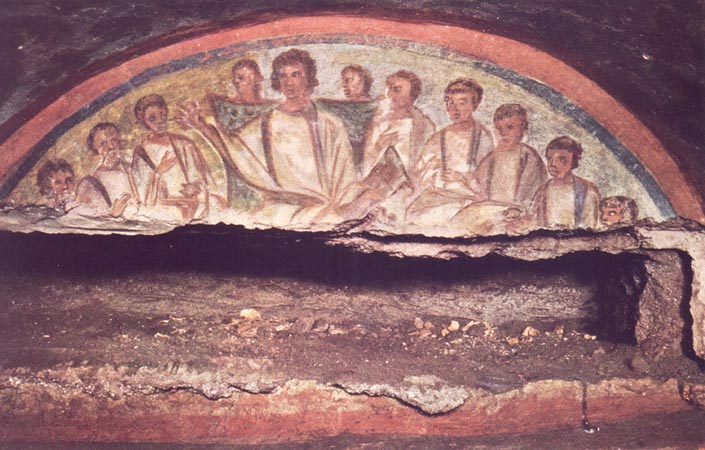The oldest Christian document from Greco-Roman Egypt, apart from the Bible, is a letter written in 230 A.D. It gives a brief but vivid picture of life in a Christian family in the days of the early church. In some ways, it goes against the conventional picture of Christians in the Roman Empire, suggesting some applications for Christians today. Including the centrality of vocation.
The manuscript, written in Greek, is part of a large collection of ancient manuscripts in Basel, Switzerland. The letter is not a new discovery, but a Swiss scholar, Sabine R. Huebner, has studied it, along with related manuscripts in the collection, drawing conclusions about the social world of Christians in that time and place. Her book, to be released in August from Cambridge University Press, is entitled Papyri and the Social World of the New Testament.
Here is the letter in full:
“Greetings, my lord, my incomparable brother Paulus. I, Arrianus, salute you, praying that all is as well as possible in your life.
[Since] Menibios was going to you, I thought it necessary to salute you as well as our lord father. Now, I remind you about the gymnasiarchy1, so that we are not troubled here. For Heracleides would be unable to take care of it: he has been named to the city council. Find thus an opportunity that you buy the two [–] arouras2.
But send me the fish liver sauce3 too, whichever you think is good. Our lady mother is well and salutes you as well as your wives and sweetest children and our brothers and all our people. Salute our brothers [-]genes and Xydes. All our people salute you.
I pray that you fare well in the Lord.”
So what can we deduce from this piece of historical evidence? The tone is both affectionate and respectful. Arrianus considers his brother Paul–an unusual name for the time, clearly named after the Apostle–“incomparable.” Arrianus uses the respectful “my lord” for his brother, as well as for his father, with a similar respectful tag for “our lady mother.”
Paul is away from home with their father and two brothers, while Arrianus is home with their mother, some other brothers, their wives and “sweetest children,” and other members of their household. (Someone thought the plural “your wives” meant that Paul had more than one, but I’m pretty sure this is a reference to the wives not only of Paul but of Xydes and the brother whose name is obscured by a tear in the manuscript.)
The most noteworthy fact that emerges is that this is apparently a wealthy and prominent family. Arrianus mentions the “gymnasiarchy,” the leader of the “gymnasium,” where athletes were trained. The person who thus supported local athletics used his own money to pay the bills, getting only civic honor and the thanks of the community in return. It was a prestigious position, though the scholar who annotated the letter says that an economic downturn in Egypt around this time often caused wealthy citizens to try to get out of this social obligation.
It isn’t clear where the family of Ariannus and Paul stood with this situation, but that they were candidates for the gymnasiarchy meant that they were of high social standing. Heracleides, whoever he was–another relative?–being chosen for the city council is also evidence of their prominence, even if he is just a friend. An “aroura” was a measure of arable land. It sounds as if since the gymnasiarchy had, fortunately, fallen through, they can use the money to buy more land.
Many of the earliest Christians were slaves, but here is a high-ranking family that holds to the faith. These Christians were not outcasts, and they did not reject the social world that they were a part of. Rather, they held public office, attended to civil affairs, and participated in the life of their communities.
To be sure, things would be different once persecution broke out, as it sporadically throughout the Roman Empire, depending on the Emperor and local officials. The “Benedict Option” of strategic withdrawal from a sinful world came later, after the fall of the Roman Empire. It would appear that Christians felt free to participate in their societies, as long as their societies would permit them to.
That the writer and recipient of this letter were Christians is evident in the references to prayer and, especially to the line “I pray that you fare well in the Lord.” Prof. Huebner says that this reference to “the Lord” is written as a contraction with a line written over it, and derives from manuscripts of the Gospel of John. (Her book has not been released yet, but you can find this discussion in the “Look Inside” feature on the Amazon entry.) She concludes that Arrianus must have read the Gospel of John in manuscript–if he had just heard it read, he would not have known about its quirky way of writing “Lord” that he here imitates.
So what we have here is a devout Christian family of the Early Church involved in sports, politics, and business. In that, they were not much difference from Christian families today.
Does that violate our idealized “saintly” image of the Early Church? It shouldn’t. Arrianus and his family were living out their Christian faith in their everyday vocations.
Illustration: “Christ the Teacher,” Early Christian catacomb painting, Public Domain, https://commons.wikimedia.org/w/index.php?curid=510313.














